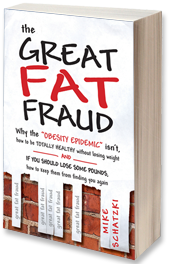Last June the news hit like a bombshell. The headlines screamed, the presses rolled. “Now Yo-yo Diets Are the Secret to a Longer Life – Yo-yo dieting can extend life and has long-term health benefits, new research has found. On-off diets that shed and put weight back in quick succession have long been criticized. But in a huge U-turn, scientists now claim they are better than not dieting at all.”
“Yo-yo Diets ‘Better than No Diets’ Study Finds – Yo-yo dieters were given new hope Tuesday after U.S. researchers said that losing and gaining weight was better for heavy people than not shedding any excess fat at all. Previous research suggested that constantly dropping and regaining weight could be harmful to health, but scientists from Ohio University found that a fluctuating body mass was better than remaining obese.”
“Yo-yo Dieting Better than Staying Obese – Although maintaining a stable, healthy weight is still ideal, ‘People should not stop trying to lose weight if they are, like I am, a person who gains weight frequently and tries to lose it,’ said study researcher Edward List, a scientist at Ohio University’s Edison Biotechnology Institute.”
Really. So what was this incredible new study? Was it published in a prestigious peer-reviewed journal such as the Journal of the American Medical Association or the New England Journal of Medicine? Well, actually no. Was it published in a lesser peer-reviewed journal? No. What was it at least published anywhere? No.
What the media was jumping all over was just a presentation (not peer reviewed) that was made, among hundreds of other presentations, at the Endocrine Society’s annual conference.
And was this a study of people as the headlines and some of the text in the stories seem to imply? No, it was a study of 25 mice. That’s right, mice not people. Talk about the mouse that roared.
What this little study did was divide the mice into three groups. One group was fed a high-fat diet, one was fed a low-fat diet, and one alternated between a high-fat and low-fat diet for four weeks at a time. The low-fat group stayed thin, the high-fat group stayed heavy, and the weight of the alternating group went up and down. The high-fat heavy group lived about a year and a half on average, whereas the low-fat group and the alternating group lived about two years on average.
So what does this little mouse study tell us? What it tells us is that mice live longer if they are fed a low-fat diet and thus remain thin or are fed an alternating high-fat/low-fat diet with a commiserate weight gain and loss, compared to mice who are fed a purely high-fat diet and remain heavy.
So is it that losing weight and gaining it again is good for people, or does it mean that feeding a mouse a purely high-fat diet over its lifetime is really bad for it, and that alternate periods of high-fat and low-fat diets are just as good for mouse as a pure low-fat diet?
The studies that have looked at people come to a diametrically opposite conclusion when it comes to yo-yo dieting. For example, a study in the New England Journal of Medicine that looked at 5,127 humans concluded that “these results indicate that persons whose body weight fluctuates often or greatly have a higher risk of coronary heart disease and death than do persons with relatively stable body weights.”
So how did this relatively meaningless little mouse study hit the media in such a big way? This kind of media coverage doesn’t just happen. Someone in the PR department where these researchers work had to have pulled this off. And where do these researchers work? They are part of Ohio University’s Edison Biotechnology Institute, which receives more than half of its funding from corporate partners, primarily biotechnology companies and pharmaceutical companies.
And why would Obesity Inc. (AKA the weight loss industry) be very happy to see a study like this blown all out of proportion to suggest that yo-yo dieting is good for people?
It has to do with Obesity Inc.’s business model. In order for weight loss industry companies to sell their services and products they must succeed in the short term in helping people to lose weight. If they don’t, they won’t attract new and repeat customers.
But what about the long term? If weight loss industry companies succeeded in providing long-term weight loss, would they be able to stay in business? The problem is that if they succeeded in providing long-term weight loss, all the people who wanted to lose weight would do so and they would keep the weight off. Thus, they would be lost as customers. Eventually, everyone would be at the weight they preferred and Obesity Inc. would go out of business.
And so weight loss industry’s long term business model is totally dependent on yo-yo dieting. And so any study, even a little mouse study, that can be manipulated and spun to suggest that yo-yo dieting is actually good for people is music to Obesity Inc. ears.







Good point. I hadn’t thought about it quite that way. 🙂